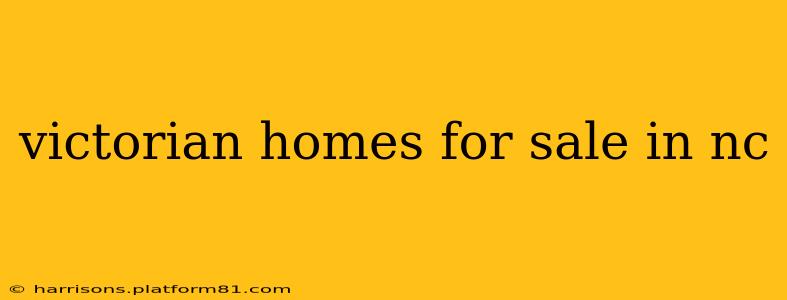North Carolina boasts a rich history, and a significant part of that legacy is reflected in its stunning Victorian-era homes. These architectural gems, with their intricate details and unique character, captivate buyers seeking a blend of history and modern comfort. Finding your dream Victorian home in NC requires understanding the market, knowing what to look for, and navigating the unique challenges of purchasing a historic property. This guide will walk you through everything you need to know about Victorian homes for sale in North Carolina.
What Defines a Victorian Home?
Before we dive into the NC market, let's clarify what constitutes a Victorian home. While the Victorian era spanned from 1837 to 1901, Victorian architectural styles aren't monolithic. Several sub-styles emerged, each with its own distinct features:
- Queen Anne: Known for its asymmetrical designs, wrap-around porches, towers, and intricate detailing.
- Stick Style: Characterized by exposed decorative woodwork and intricate detailing on the exterior.
- Eastlake: Featuring geometric patterns, turned spindles, and bold ornamentation.
- Italianate: Defined by low-pitched roofs, wide eaves, and towers or cupola.
- Gothic Revival: Distinguished by pointed arches, steep roofs, and decorative gables.
Understanding these sub-styles will help you refine your search and appreciate the nuances of each property. Many homes blend elements from multiple styles, creating unique and fascinating results.
Where to Find Victorian Homes in NC?
Victorian homes aren't evenly distributed across North Carolina. Some areas boast a higher concentration than others. Cities and towns with strong historical preservation efforts are prime locations to find well-maintained Victorian properties. Consider exploring areas like:
- Asheville: Known for its stunning mountain scenery and collection of well-preserved Victorian homes.
- Wilmington: A coastal city with a rich history and numerous examples of Victorian architecture.
- Raleigh: While not as densely packed with Victorians as some other areas, Raleigh still possesses pockets of historic neighborhoods with charming examples.
- Charlotte: Though less prevalent than in other cities, Charlotte's older neighborhoods contain some hidden Victorian treasures.
- Smaller towns throughout the state: Many smaller towns and villages across North Carolina also retain beautiful Victorian homes, often offering a more peaceful and affordable alternative to the larger cities.
What to Look for When Buying a Victorian Home in NC?
Purchasing a Victorian home is an exciting but significant undertaking. Beyond the aesthetic appeal, consider these crucial aspects:
- Structural Integrity: Victorian homes, due to their age, may require extensive repairs or renovations. Thorough inspections by qualified professionals specializing in historic homes are crucial. Look for signs of foundation settling, water damage, and pest infestations.
- Maintenance Costs: Maintaining a Victorian home requires a significant financial commitment. The intricate details, older systems, and unique materials necessitate specialized maintenance and repairs. Budget accordingly.
- Modernization vs. Preservation: Decide how much you want to modernize the home while preserving its historical character. Striking a balance is essential to maintain the property's value and charm.
- Plumbing and Electrical Systems: Older Victorian homes often have outdated plumbing and electrical systems. Replacing these systems can be costly but essential for safety and functionality.
What are the common problems with Victorian homes?
Victorian homes, while beautiful, often present unique challenges due to their age and construction methods. Common problems include:
- Foundation Issues: Settlement and cracking are common, requiring potentially expensive repairs.
- Plumbing and Electrical Systems: These systems are often outdated and may need complete replacement.
- Window and Door Problems: Finding replacement parts for original windows and doors can be difficult and costly.
- Roofing: The complex rooflines of many Victorian homes can be prone to leaks and require specialized maintenance.
- Pest Infestations: Older homes can be susceptible to termites, carpenter ants, and other pests.
How much does it cost to restore a Victorian home?
The cost of restoring a Victorian home varies dramatically depending on the size of the home, the extent of necessary repairs, the location, and the materials used. Restoration projects can easily run into the hundreds of thousands, or even millions, of dollars. It's crucial to get detailed estimates from experienced contractors specializing in historic home restoration before embarking on any project.
How do I find a reputable contractor for Victorian home restoration?
Finding a reputable contractor experienced in working with Victorian homes is critical. Seek recommendations from local historical societies, preservation organizations, or other homeowners who have undertaken similar projects. Check references carefully, and ensure the contractor has the necessary insurance and licenses.
What are the benefits of buying a Victorian home?
Despite the challenges, owning a Victorian home offers numerous rewards:
- Unique Character: Victorian homes possess unparalleled charm and character, setting them apart from modern constructions.
- Investment Potential: Well-maintained Victorian homes can appreciate in value significantly over time.
- Sense of History: Living in a Victorian home connects you to a rich past and allows you to be a part of preserving architectural history.
- Pride of Ownership: Owning and restoring a Victorian home is a rewarding experience that fosters a deep sense of accomplishment.
By carefully considering these factors, you can embark on the exciting journey of finding and purchasing your dream Victorian home in North Carolina. Remember to prioritize thorough inspections, realistic budgeting, and collaboration with experienced professionals to ensure a smooth and successful transition into your new historic home.
